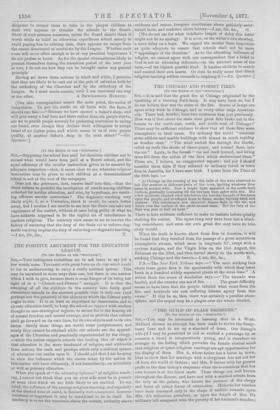[TO THE EDITOR OF THE " SpEariroa."3
SIR,—Supposing the school fees paid for destitute children not to exceed what would have been paid at a Board school, and the equal efficiency of the secular instruction given to be ensured by adequate inspection—then, it seems clear to me, whatever religious instruction may be given to such children at a denominational school is not at the cost of the ratepayer.
Does not the grievance, then, resolve itself into this,—that the State refuses to prohibit the inculcation of creeds among children collected for secular education, and who, by hypothesis, are receiv- ing efficient secular instruction? The dogmatic teaching very likely might, I, as a Unitarian, think it wouid, be much better away, but I confess I am unable to see how the State can take any cognizance of the matter, without at once being guilty of what we have hitherto supposed to be the capital sin of interference in matters religious. The contrary view seems to me to involve the fallacy of assumiug that the duty of the State not to enforce dog- matic teaching implies the duty of enforcing not-dogmatic teaching.


































 Previous page
Previous page